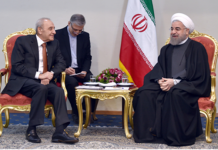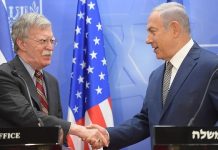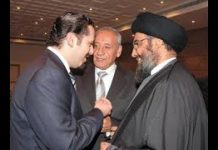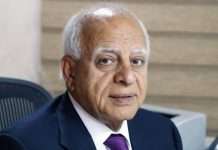Home تعليقات ومقالات مميزة عبد الرحمن الراشد/الاتفاق يقوي متشددي طهران/Abdulrahman al-Rashed/The nuclear deal will empower Iran’s...
الاتفاق يقوي متشددي طهران
عبد الرحمن الراشد/الشرق الأوسط/13 أيار/15
هناك وهم بأن الاتفاق الموعود مع إيران في إطار البرنامج النووي سيدفع الدولة الإيرانية إلى الاعتدال، ويشجعها على الانفتاح الاقتصادي، فالسياسي. إنما، الأرجح هو العكس تماما، سيقوي الاتفاق جناح الصقور، الذي يروج حاليا داخل إيران مفاخرًا بأن الغرب أخيرًا رضخ وتخلى عن عقوباته، وأن معظم مشروعه النووي تم إنجازه. وخلال أشهر المفاوضات الدولية الماضية ازدادت القبضة الأمنية قسوة ضد خصوم الدولة، لتعبر عن حالة من ثقة النظام بنفسه. فانتفاضة الأكراد قبل أسبوع التي شهدتها مدينتهم مهاباد، في شمال غربي إيران، كانت ضد ممارسات الأمن، وقد اضطرت فتاة حاول العسكر اغتصابها إلى القفز من الشرفة، فثارت الأقلية الكردية التي يبلغ عددها ثمانية ملايين نسمة.
والقسوة وراء الغضب المتنامي في أطراف هذه الدولة المتعددة الإثنيات ضد المركز. وقد زاد عدد الجماعات المسلحة المعادية للنظام، إضافة إلى المعارضة الإيرانية المسلحة (مجاهدي خلق).
والمعارضة المدنية في طهران تخشى أن توقيع الاتفاق على البرنامج النووي مع الغرب سيصب في صالح المتشددين داخل النظام، بعكس ما يروج له في واشنطن. وليس سرًا الصراع داخل الدولة بين المعسكرين، المتشدد والمعتدل. والحالة الوحيدة التي مرت بها إيران تحت قيادة معتدلة، كانت في فترة الزعيم الشعبي محمد خاتمي الذي صعد لسدة الرئاسة في عام 1997 وحتى خروجه 2005، وقوبل بحرب واسعة ضد التيار كله من قبل رجال الدين. ثم جيء بعده بزعيم متطرف، محمود أحمدي نجاد، الذي قاد إيران إلى الوضع الذي نراه اليوم، المزيد من التطرف والعسكرة، حيث تخوض برغبتها حروبا في العراق وسوريا واليمن، كما ينشط الحرس الثوري على جبهات داخلية يحاول قمع الفتن، مثلما فعل في مهاباد، وإقليم بلوشستان، جنوب غربي البلاد، وزاد من وجوده في خوزستان حيث توجد الأقلية العربية المتململة. وسبق أن واجهت الحكومة مصاعب جمة في ترويض سكانها الأذريين. ولا تزال العاصمة، طهران، تتذكر الانتفاضة الكبيرة التي اندلعت بعد تزوير الانتخابات في عام 2009، وامتدت إلى فبراير (شباط) من العام التالي، وقادها إصلاحيون من داخل النظام انتهوا جميعا في الحبس.
بتوقيع الاتفاق مع الغرب سيشعر الجناح المتشدد بثقة أكبر، مدركًا أن الخطر الخارجي قد تم تحييده، ولم يعد أحد قادرا على الوقوف في وجهه. ولو أن الإدارة الأميركية كانت قد ربطت إطار الاتفاق النووي بشروط تلزم الحكومة الإيرانية على التوقف عن مغامراتها العسكرية، مقابل إنهاء حالة الحصار الدولي، والتعهد بعدم استهداف الغرب لإيران عسكريا، لربما عزز وضع المعتدلين داخل النظام الثيوقراطي هناك. بخلاف ذلك، سيمنح الاتفاق المتشددين هديتين، رفع العقوبات الاقتصادية التي ستملأ خزينتهم بالأموال التي يحتاجونها لإدارة معاركهم، والثانية سيقوي مركزهم داخل النظام نفسه ضد رجال الدين والسياسيين المعتدلين.
The nuclear deal will empower Iran’s hardliners
Wednesday, 13 May 2015
Abdulrahman al-Rashed/Al Arabiya
There is an illusion that the promised agreement with Iran regarding its nuclear program will push it toward moderation, as well as economic and political openness. What will probably happen is the complete opposite. The agreement will empower Tehran’s hawks, who are currently being marketed in Iran and who are bragging that most of the nuclear program has been accomplished and that the West has finally submitted and abandoned sanctions.
During the past few months of international negotiations, Iran’s security fist tightened against state rivals, voicing the regime’s self-confidence. The Kurdish rebellion a week ago in the city of Mahabad, northwest Iran, was to protest security forces’ practices. A girl whom a military officer tried to rape jumped off a balcony, and the Kurdish minority – whose population is 8 million – revolted.
Cruelty is behind growing anger in the outskirts of this multiethnic state. In addition to the armed Iranian opposition (People’s Mojahedin of Iran), the number of anti-regime armed groups has increased.
Military adventures
The civil opposition in Tehran fears that signing the nuclear agreement with the West will, unlike what is being promoted in Washington, serve the interests of regime hardliners. The struggle between moderates and hardliners within the state is no secret. The only case when Iran was led by a moderate was under popular leader Mohammed Khatami, who was president from 1997 until 2005.
By signing the nuclear agreement, the hardliners will feel more confident, aware that foreign threats will have been neutralized and that no one will be able to confront them
Khatami was met with clerics’ expanded war against the entire moderate movement. He was replaced by extremist Mahmoud Ahmedinejad, who led Iran to its current situation of more extremism and militarism, and thus engaging in wars in Iraq, Syria and Yemen.
The Iranian Revolutionary Guards are also active domestically trying to suppress sedition, as they have done in Mahabad and Balochistan province in the southwest. They have also increased their presence in Khuzestan province, where there is a restive Arab population. The government has previously faced considerable difficulties in taming its Azeri citizens.
Tehran still remembers the huge uprising that erupted after the rigged elections in 2009, which lasted until Feb. 2010. That revolt was led by reformists from within the regime, and they all ended up in jail.
By signing the nuclear agreement, the hardliners will feel more confident, aware that foreign threats will have been neutralized and that no one will be able to confront them. If Washington had linked the deal to conditions obliging Tehran to halt its military adventures in exchange for ending international sanctions and a pledge that the West will not militarily target Iran, the situation of the moderates within the theocratic regime may have been enhanced.
The agreement will grant hardliners two gifts. The first is that lifting economic sanctions will fill their treasury with funds to manage their battles. The second is that they will have a stronger status within the regime and against moderate clerics and politicians.






















